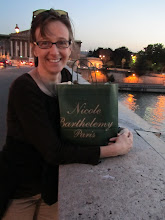
La Casa dei Formaggi is featuring a new cheese exclusive for
Wine Authorities labeled Toro Ubriaco. This cheese was first released on December 12 2008 in Bull city, Durham. It is made using the skins of Sangiovese grape from
Grove winery.
The Formaggio Toro Ubriaco (Drunken Bull) has its origin in
Eastern Italy.
Several folk stories describe the genesis of this cheese. Some stories link its origin to WWI when the farmers, trying to defend their stocks from soldiers’ raids, would hide the cheese under grape skins. Other stories trace the origin to the lack of resources among farmers as being the main reason why the cheese was born. The oil to treat the cheese rinds was very expensive; hence, some farmers used the grape skins to keep the rinds moist and clean. The result was a very aromatic cheese that would last much longer. There is also a story about a crooked cheesemaker who tried to hide some wheels from his boss by dumping them into a fermenting must barrel. This cheese became the ‘forte’ of that dairy and soon the trick of aging the cheese in grape skins proliferated among many dairies of the area and beyond.
 La Casa dei Formaggi is featuring a new cheese exclusive for Wine Authorities labeled Toro Ubriaco. This cheese was first released on December 12 2008 in Bull city, Durham. It is made using the skins of Sangiovese grape from Grove winery.
La Casa dei Formaggi is featuring a new cheese exclusive for Wine Authorities labeled Toro Ubriaco. This cheese was first released on December 12 2008 in Bull city, Durham. It is made using the skins of Sangiovese grape from Grove winery.


